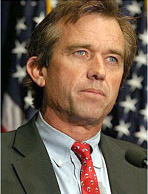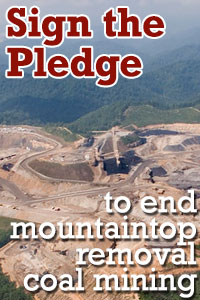The High Cost of Coal
In a world of rising energy prices, rising global temperatures, and rising sea levels, Americans are calling for clean and affordable energy. Yet under the influence of big energy companies, policy-makers are stubbornly clinging to the old, dirty fossil fuel technologies of the past. Along with global warming, mountaintop removal is an egregious example of the destructive impact of our addiction to coal.
On this page you will learn about the high cost of coal from a variety of viewpoints including coalfield residents and national energy experts. We also invite you to contribute to the discussion by commenting on their posts.
Comments Off on
 I recall a conversation that I had with my father when I was 14 years old and he was fighting strip mining in Appalachia. There was no environmental issue about which my father cared more passionately than strip mining. He visited the Appalachian coalfields in 1966 and many times thereafter. He explained to me that the strip miners were not just destroying the environment, they were permanently impoverishing the region; there was no way that Appalachian communities could rebuild an economy from the barren moonscapes the strip industry left behind. “And,” he told me, “they are doing it to break the unions.” Read More….
I recall a conversation that I had with my father when I was 14 years old and he was fighting strip mining in Appalachia. There was no environmental issue about which my father cared more passionately than strip mining. He visited the Appalachian coalfields in 1966 and many times thereafter. He explained to me that the strip miners were not just destroying the environment, they were permanently impoverishing the region; there was no way that Appalachian communities could rebuild an economy from the barren moonscapes the strip industry left behind. “And,” he told me, “they are doing it to break the unions.” Read More….
53 Comments » Leave your own...
 The only limits so far honored by this industry have been technological. What its machines have enabled it to do, it has done. And now, for the sake of the coal under them, it is destroying whole mountains with their forests, water courses and human homeplaces. The resulting rubble of soils and blasted rocks is then shoved indiscriminately into the valleys. This is a history by any measure deplorable, and a commentary sufficiently devastating upon the intelligence of our politics and our system of education. That Kentuckians and their politicians have shut their eyes to this history as it was being made is an indelible disgrace. That they now permit this history to be justified by its increase of the acreage of “flat land” in the mountains signifies an indifference virtually suicidal. Read More….
The only limits so far honored by this industry have been technological. What its machines have enabled it to do, it has done. And now, for the sake of the coal under them, it is destroying whole mountains with their forests, water courses and human homeplaces. The resulting rubble of soils and blasted rocks is then shoved indiscriminately into the valleys. This is a history by any measure deplorable, and a commentary sufficiently devastating upon the intelligence of our politics and our system of education. That Kentuckians and their politicians have shut their eyes to this history as it was being made is an indelible disgrace. That they now permit this history to be justified by its increase of the acreage of “flat land” in the mountains signifies an indifference virtually suicidal. Read More….
8 Comments » Leave your own...
 Nearly a thousand miles separates the coalfields of West Virginia from the city of New Orleans and the Gulf coast, yet they are a lot closer than that. The connection is carbon. Coal is mostly carbon and for every ton burned, 3.6 tons of CO2 eventually enters the atmosphere raising global temperatures, warming oceans thereby creating bigger storms, melting ice, and raising sea levels. For every ton of coal extracted from the mountains, perhaps a 100 tons of what is tellingly called “overburden” is dumped, burying steams and filling the valleys and hollows of West Virginia, Kentucky, Virginia, and Tennessee. And between the hills of Appalachia and the sinking land of the Louisiana coast, tens of thousands of people living downwind from coal-fired power plants die prematurely each year from inhalation of small particles of smoke laced with heavy metals that penetrate deeply into their lungs. Read More….
Nearly a thousand miles separates the coalfields of West Virginia from the city of New Orleans and the Gulf coast, yet they are a lot closer than that. The connection is carbon. Coal is mostly carbon and for every ton burned, 3.6 tons of CO2 eventually enters the atmosphere raising global temperatures, warming oceans thereby creating bigger storms, melting ice, and raising sea levels. For every ton of coal extracted from the mountains, perhaps a 100 tons of what is tellingly called “overburden” is dumped, burying steams and filling the valleys and hollows of West Virginia, Kentucky, Virginia, and Tennessee. And between the hills of Appalachia and the sinking land of the Louisiana coast, tens of thousands of people living downwind from coal-fired power plants die prematurely each year from inhalation of small particles of smoke laced with heavy metals that penetrate deeply into their lungs. Read More….
2 Comments » Leave your own...
 The real Appalachia is lush green mountains, deep ancient forests, ice-cold trout streams, small hill-farms, and little mountain communities filled with unpretentious working-class people. Common sense and commitment are common values. Appalachians tend to look back more than most other Americans. They define who they are by how they fit into an extended family, which includes ancestors. Their roots run deep in the mountain soil, deeper than corporate greed and political corruption. Read More….
The real Appalachia is lush green mountains, deep ancient forests, ice-cold trout streams, small hill-farms, and little mountain communities filled with unpretentious working-class people. Common sense and commitment are common values. Appalachians tend to look back more than most other Americans. They define who they are by how they fit into an extended family, which includes ancestors. Their roots run deep in the mountain soil, deeper than corporate greed and political corruption. Read More….
19 Comments » Leave your own...









 I recall a conversation that I had with my father when I was 14 years old and he was fighting strip mining in Appalachia. There was no environmental issue about which my father cared more passionately than strip mining. He visited the Appalachian coalfields in 1966 and many times thereafter. He explained to me that the strip miners were not just destroying the environment, they were permanently impoverishing the region; there was no way that Appalachian communities could rebuild an economy from the barren moonscapes the strip industry left behind. “And,” he told me, “they are doing it to break the unions.”
I recall a conversation that I had with my father when I was 14 years old and he was fighting strip mining in Appalachia. There was no environmental issue about which my father cared more passionately than strip mining. He visited the Appalachian coalfields in 1966 and many times thereafter. He explained to me that the strip miners were not just destroying the environment, they were permanently impoverishing the region; there was no way that Appalachian communities could rebuild an economy from the barren moonscapes the strip industry left behind. “And,” he told me, “they are doing it to break the unions.”  The only limits so far honored by this industry have been technological. What its machines have enabled it to do, it has done. And now, for the sake of the coal under them, it is destroying whole mountains with their forests, water courses and human homeplaces. The resulting rubble of soils and blasted rocks is then shoved indiscriminately into the valleys. This is a history by any measure deplorable, and a commentary sufficiently devastating upon the intelligence of our politics and our system of education. That Kentuckians and their politicians have shut their eyes to this history as it was being made is an indelible disgrace. That they now permit this history to be justified by its increase of the acreage of “flat land” in the mountains signifies an indifference virtually suicidal.
The only limits so far honored by this industry have been technological. What its machines have enabled it to do, it has done. And now, for the sake of the coal under them, it is destroying whole mountains with their forests, water courses and human homeplaces. The resulting rubble of soils and blasted rocks is then shoved indiscriminately into the valleys. This is a history by any measure deplorable, and a commentary sufficiently devastating upon the intelligence of our politics and our system of education. That Kentuckians and their politicians have shut their eyes to this history as it was being made is an indelible disgrace. That they now permit this history to be justified by its increase of the acreage of “flat land” in the mountains signifies an indifference virtually suicidal.  Nearly a thousand miles separates the coalfields of West Virginia from the city of New Orleans and the Gulf coast, yet they are a lot closer than that. The connection is carbon. Coal is mostly carbon and for every ton burned, 3.6 tons of CO2 eventually enters the atmosphere raising global temperatures, warming oceans thereby creating bigger storms, melting ice, and raising sea levels. For every ton of coal extracted from the mountains, perhaps a 100 tons of what is tellingly called “overburden” is dumped, burying steams and filling the valleys and hollows of West Virginia, Kentucky, Virginia, and Tennessee. And between the hills of Appalachia and the sinking land of the Louisiana coast, tens of thousands of people living downwind from coal-fired power plants die prematurely each year from inhalation of small particles of smoke laced with heavy metals that penetrate deeply into their lungs.
Nearly a thousand miles separates the coalfields of West Virginia from the city of New Orleans and the Gulf coast, yet they are a lot closer than that. The connection is carbon. Coal is mostly carbon and for every ton burned, 3.6 tons of CO2 eventually enters the atmosphere raising global temperatures, warming oceans thereby creating bigger storms, melting ice, and raising sea levels. For every ton of coal extracted from the mountains, perhaps a 100 tons of what is tellingly called “overburden” is dumped, burying steams and filling the valleys and hollows of West Virginia, Kentucky, Virginia, and Tennessee. And between the hills of Appalachia and the sinking land of the Louisiana coast, tens of thousands of people living downwind from coal-fired power plants die prematurely each year from inhalation of small particles of smoke laced with heavy metals that penetrate deeply into their lungs.  The real Appalachia is lush green mountains, deep ancient forests, ice-cold trout streams, small hill-farms, and little mountain communities filled with unpretentious working-class people. Common sense and commitment are common values. Appalachians tend to look back more than most other Americans. They define who they are by how they fit into an extended family, which includes ancestors. Their roots run deep in the mountain soil, deeper than corporate greed and political corruption.
The real Appalachia is lush green mountains, deep ancient forests, ice-cold trout streams, small hill-farms, and little mountain communities filled with unpretentious working-class people. Common sense and commitment are common values. Appalachians tend to look back more than most other Americans. They define who they are by how they fit into an extended family, which includes ancestors. Their roots run deep in the mountain soil, deeper than corporate greed and political corruption. 